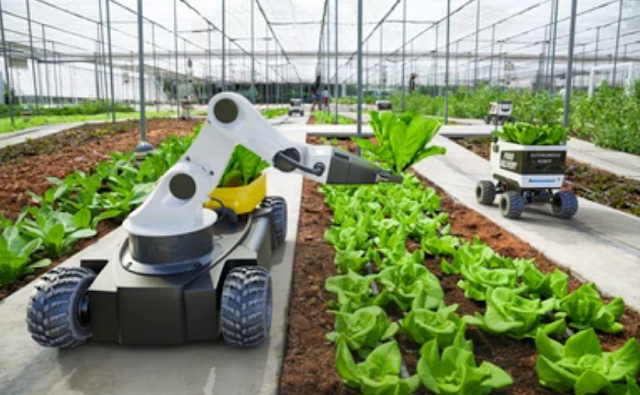AI in Agriculture: Transforming Farming Practices with Smart Solutions
AI (Artificial Intelligence) is playing a transformative role in the field of agriculture by revolutionizing farming practices and enabling smart solutions. AI-powered technologies leverage machine learning, data analytics, and robotics to enhance crop production, optimize resource management, improve pest and disease control, and enable precision agriculture. Here is a detailed exploration of how AI is transforming agriculture and enabling smarter farming practices.
Crop Monitoring and Management:
AI enables real-time crop monitoring and management through the analysis of data collected from various sources, such as satellite imagery, drones, and IoT (Internet of Things) sensors. Machine learning algorithms analyze this data to provide insights into crop health, growth patterns, nutrient deficiencies, and water requirements. AI-powered systems can detect early signs of plant stress, optimize irrigation schedules, and recommend appropriate fertilization strategies, leading to improved crop yields and resource efficiency.
Precision Agriculture:
AI enables precision agriculture, which involves the use of advanced technologies to optimize farming practices at the individual plant or field level. AI-powered systems can create detailed field maps, identify variability in soil conditions, and provide precise recommendations for seed planting, fertilization, and pesticide application. By tailoring farming practices to the specific needs of each plant or area, precision agriculture reduces resource wastage, minimizes environmental impact, and increases overall productivity.
Crop Yield Prediction:
AI algorithms can predict crop yields based on historical data, weather patterns, and various other factors. By analyzing data such as soil quality, weather conditions, and previous crop performance, AI-powered systems can generate accurate predictions of crop yields. These predictions help farmers make informed decisions regarding crop selection, resource allocation, and market planning, leading to optimized production and improved profitability.
Pest and Disease Detection:
AI enables early detection and monitoring of pests and diseases in crops. AI-powered image recognition algorithms can analyze images of plants to identify signs of pest infestations or diseases. With early detection, farmers can take timely action to mitigate the spread and minimize crop losses. AI also assists in providing targeted treatment recommendations, reducing the need for excessive pesticide use and improving overall crop health.
Automated Farming Operations:
AI-powered robotics and automation are transforming farming operations. Robots equipped with AI algorithms can perform tasks such as planting, harvesting, and weeding with precision and efficiency. These robots can navigate fields autonomously, analyze plant health, and carry out targeted actions. Automation reduces labor costs, increases operational efficiency, and allows farmers to focus on strategic decision-making and management.
Farm Management Systems:
AI-powered farm management systems integrate various data sources, such as weather data, soil information, and machinery performance, to provide comprehensive insights and recommendations for farm management. These systems can assist in optimizing planting schedules, managing equipment maintenance, tracking crop performance, and ensuring regulatory compliance. AI-driven farm management systems help farmers make data-driven decisions, improve operational efficiency, and maximize yields.
Agricultural Robotics and Drones:
AI-powered drones and robotic systems are used in agriculture for a range of tasks. Drones equipped with sensors and AI algorithms can capture high-resolution imagery of fields, monitor crop health, and identify areas that require attention. Robotic systems can perform precision tasks such as selective spraying, seed planting, and harvesting, increasing accuracy and reducing manual labor.
Data-driven Decision-making:
AI facilitates data-driven decision-making in agriculture by analyzing and interpreting large volumes of data. AI algorithms can process data related to weather patterns, soil conditions, crop performance, and market trends to provide actionable insights. Farmers can make informed decisions regarding crop selection, planting strategies, resource allocation, and market timing, leading to improved profitability and sustainability.
The implementation of AI in agriculture brings numerous benefits, including increased productivity, reduced resource wastage, improved sustainability, and enhanced profitability. However, it is important to address challenges such as data privacy, infrastructure requirements, and the need for training and education to ensure the effective and responsible use of AI in farming practices.
In conclusion, AI is transforming agriculture by enabling smart solutions and revolutionizing farming practices. AI-powered technologies improve crop monitoring and management, enable precision agriculture, predict crop yields, detect pests and diseases, automate farming operations, and facilitate data-driven decision-making. By leveraging AI, farmers can optimize production, minimize environmental impact, and contribute to sustainable and efficient agricultural systems.












